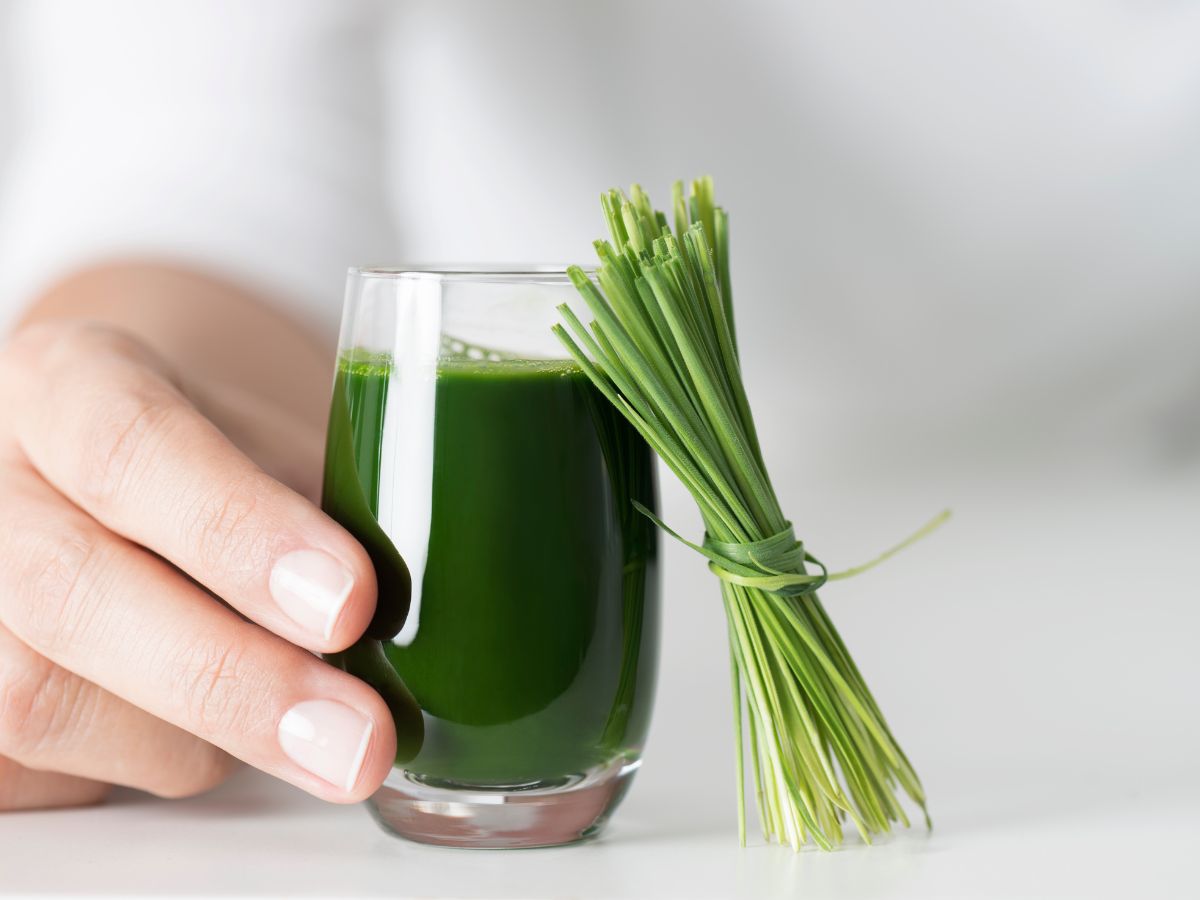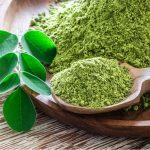In a world where health is paramount, finding natural ways to boost your well-being is essential. The health benefits of wheatgrass are nothing short of extraordinary. This vibrant green superfood can energize your body, protect against disease, and enhance your natural beauty.
Ready to unlock the secrets of wheatgrass? Keep reading to discover why this potent green shot could be your ultimate health ally.
What is Wheatgrass?

Before diving into the myriad benefits of wheatgrass, it’s essential to understand what it is. Wheatgrass is the young, tender shoots of the wheat plant.
Unlike the mature wheat plant that requires large fields to grow, wheatgrass can be cultivated indoors.
When the leaves grow and begin to split, the blades are snipped off and juiced. This creates a potent green drink. While its taste can be quite strong and might not appeal to everyone, wheatgrass is also available in capsules, tablets, and powder forms.
If the flavor isn’t to your liking, blend wheatgrass powder into smoothies. This way, you can still enjoy the benefits of wheatgrass without the strong taste.
Boost Your Energy Levels Naturally
Feeling fatigued? Instead of reaching for that cup of coffee, consider a shot of wheatgrass juice.
Wheatgrass is packed with iron, calcium, magnesium, phytonutrients, amino acids, and a spectrum of vitamins, including A, C, E, and the B complex.
Moreover, it contains chlorophyll, the green pigment that increases oxygen supply to your cells. This leaves you feeling revitalized and full of energy.
Consuming 1 to 4 ounces of this green liquid daily can make a significant difference in your energy levels.
Lower Cholesterol Naturally

High cholesterol can lead to serious health issues, including heart disease. Wheatgrass offers a natural way to manage your cholesterol levels.
Cholesterol is necessary for hormone production and digestion, but when it’s out of balance, it can be harmful.
Studies on animals have shown that wheatgrass consumption over 10 weeks led to increased levels of HDL (good cholesterol). This suggests that the health benefits of wheatgrass could extend to humans as well. It might help in lowering bad cholesterol and promoting heart health [2].
Ease Menstrual Cramps
For many individuals, the time of the month can be accompanied by painful cramps and discomfort.
A diet lacking in essential nutrients can exacerbate these symptoms. Research suggests that micronutrients, including vitamins D, E, B1, and K, as well as minerals like calcium, magnesium, and zinc, can significantly reduce the severity of menstrual pain [3].
Incorporating wheatgrass into your daily routine, which is rich in several of these essential nutrients, may lead to more comfortable, pain-free periods.
Accelerate Wound Healing

Wheatgrass is not only beneficial when ingested but can also be applied topically to speed up wound healing. Its high vitamin C and iron content work together to repair tissue, while chlorophyll stimulates red blood cell production.
Whether you have a cut, burn, or skin lesion, applying wheatgrass paste directly to the affected area can promote faster healing.
The benefits of wheatgrass extend beyond mere nutrition. It offers a versatile solution for both internal and external health.
Combat Urinary Tract Infections
Urinary tract infections (UTIs) are not only uncomfortable but can become serious if left untreated. Wheatgrass has shown promise in reducing inflammation, making it a powerful ally in fighting UTIs. Its mild diuretic properties help flush out the urinary tract. This reduces infection and inflammation of the bladder and urethra.
To maximize the health benefits of wheatgrass, it should be consumed with plenty of fluids, ensuring that your urinary tract remains clear and healthy.
Manage Blood Disorders

Thalassemia, a genetic blood disorder, reduces the amount of hemoglobin and red blood cells in your body. This affects your blood’s ability to carry oxygen. This condition often requires regular blood transfusions [4].
However, research has shown that regular consumption of wheatgrass can boost hemoglobin and red blood cell counts. This might reduce the need for transfusions.
This natural, cost-effective solution highlights the significant benefits of wheatgrass in managing serious health conditions.
Guard Against Cancer
Cancer is a formidable disease, often caused by a combination of pollutants, chemicals, toxic foods, and genetic factors. Wheatgrass has demonstrated potential in test-tube studies for killing cancer cells, particularly in cases of oral and blood cancers.
Additionally, wheatgrass may help reduce the complications of chemotherapy by supporting bone marrow function [8].
While more research is needed, these findings suggest that the health benefits of wheatgrass could play a role in cancer prevention and treatment.
Stabilize Blood Sugar Levels
If you have a sweet tooth, managing blood sugar levels can be challenging, especially if you’re at risk of type 2 diabetes.
High blood sugar can damage your skin, vision, and nerves, leading to headaches, thirst, hunger, and fatigue. A study on animals found that wheatgrass extract significantly reduced blood sugar levels after 30 days.
While adding wheatgrass to your diet can help, it’s also important to incorporate mild physical activity to keep blood sugar in check.
Aid in Weight Loss

Maintaining a healthy weight is crucial for overall health, and wheatgrass can be an effective tool in your weight loss journey. This low-calorie, fat-free juice boosts metabolism and promotes a feeling of fullness, thanks to its thylakoid content.
Thylakoids, found in wheatgrass as well as other greens like lettuce, kale, and spinach, slow down stomach emptying. They also increase the production of hormones that reduce hunger.
By adding wheatgrass to your diet, you can support your weight loss goals and achieve a healthier body.
Improve Mental Health
Depression affects approximately 4.5% of the U.S. population, increasing the risk of serious health issues like stroke and heart disease.
The nutrients in wheatgrass, particularly vitamin K and iron, have a positive impact on mental health by reducing oxidative stress in the brain.
Incorporating wheatgrass into your diet can be a natural way to lift your mood and support your mental well-being.
Support Digestive Health
Digestive issues such as gas, bloating, and constipation can be uncomfortable and disruptive. Wheatgrass offers a natural solution by promoting gut health and improving nutrient absorption.
Whether you’ve overeaten at a social event or suffer from chronic digestive problems, wheatgrass can help alleviate symptoms and support overall digestive function.
Detoxify Your Liver

With so many detox products on the market, it can be overwhelming to choose the right one.
However, wheatgrass provides a natural way to detoxify the liver without introducing harmful chemicals into your body. Studies have shown that wheatgrass can mitigate the effects of alcohol and fatty foods on the liver, making it an excellent choice for liver support [13].
When selecting wheatgrass products, opt for organic varieties to avoid pesticides.
Protect Your Skin from UV Damage
In our digital age, we are constantly exposed to UV radiation from screens and devices. This can harm our skin over time. Wheatgrass, rich in chlorophyll, can protect your skin from the damaging effects of UV radiation.
Applying wheatgrass juice to affected areas can reduce redness, hyperpigmentation, and itching. This provides soothing relief and prevents further damage [14].
Promote Hair Health
For those struggling with dandruff or hair loss, wheatgrass offers a natural remedy. Although the exact mechanism is not fully understood, traditional medicine suggests that wheatgrass balances the pH of the scalp and repairs hair follicles.
Regular use of wheatgrass can prevent hair fall and maintain the natural color of your hair, resulting in luscious, healthy locks.
Relieve Joint Pain

Arthritis and joint pain can significantly impact your quality of life, making everyday tasks difficult.
Wheatgrass, with its anti-inflammatory properties, can help reduce joint pain and improve mobility.
A diet rich in chlorophyll, like that found in wheatgrass, has been shown to alleviate symptoms of arthritis [15]. offering a natural alternative to pain relief.
Enhance Fertility
For those trying to conceive, wheatgrass may boost fertility by providing essential nutrients that support reproductive health. Studies have shown that wheatgrass can increase the production of sex hormones, improving fertility outcomes [16].
The high magnesium and chlorophyll content help restore balance to the reproductive system. This makes wheatgrass a valuable addition to your diet if you’re planning to start a family.
Strengthen Immunity
A strong immune system is essential for staying healthy year-round.
Wheatgrass, with its chlorophyll content, can boost your immune response and reduce inflammation. This lowers your risk of chronic diseases like cancer and heart disease [17].
Incorporating wheatgrass into your diet can help you maintain robust health, no matter the season.
Conclusion: A Superfood Worth Incorporating into Your Diet

Wheatgrass offers a multitude of health benefits, from boosting energy levels to supporting heart health and even providing cancer protection. Its versatility and nutrient density make it a valuable addition to any diet.
However, it’s important to consume wheatgrass in moderation, especially if you have gluten sensitivity or are pregnant. For those seeking to enhance their health, wheatgrass is a natural, effective choice.
For additional nutritional support, consider incorporating other nutrient-rich foods into your diet.
The benefits of Lemon and the benefits of Ginger are well-documented and can complement the advantages offered by wheatgrass.
Together, these superfoods can provide a powerful boost to your overall health.
Remember, moderation is key, and it’s always best to consult with a healthcare professional before making any significant dietary changes.
References:
- Hypolipidemic effect of fresh Triticum aestivum (wheat) grass juice in hypercholesterolemic rats. PubMed. Available at: https://pubmed.ncbi.nlm.nih.gov/21485304/
- The Effect of Micronutrients on Pain Management of Primary Dysmenorrhea: a Systematic Review and Meta‐Analysis. PubMed. Available at: https://www.ncbi.nlm.nih.gov/pmc/articles/PMC7146731/
- A pilot study on wheatgrass juice for its phytochemical, nutritional and therapeutic potential on chronic diseases. Available at: https://www.chemijournal.com/vol2issue4/dec2014/2-3-9.1.pdf
- .
- .
- .
- Wheat grass juice may improve chemotherapy-related hematological toxicity in breast cancer patients: a pilot study. PubMed. Available at: https://pubmed.ncbi.nlm.nih.gov/17571966/
- .
- .
- .
- .
- Effect of wheatgrass on membrane fatty acid composition during hepatotoxicity induced by alcohol and heated PUFA. PubMed. Available at: https://pubmed.ncbi.nlm.nih.gov/24706101/
- Prevention and treatment of acute radiation-induced skin reactions: a systematic review and meta-analysis of randomized controlled trials. BMC Cancer. Available at: https://bmccancer.biomedcentral.com/articles/10.1186/1471-2407-14-53
- Uncooked, lactobacilli-rich, vegan food and rheumatoid arthritis. PubMed. Available at: https://pubmed.ncbi.nlm.nih.gov/9566667/
- Nutritional value and impact of wheatgrass juice (Green Blood Therapy) on increasing fertility in male albino rats. Bulletin of the National Research Centre. Available at: https://bnrc.springeropen.com/articles/10.1186/s42269-020-0272-x
- Chlorophyll revisited: anti-inflammatory activities of chlorophyll a and inhibition of expression of TNF-α gene by the same. PubMed. Available at: https://pubmed.ncbi.nlm.nih.gov/22038065/




